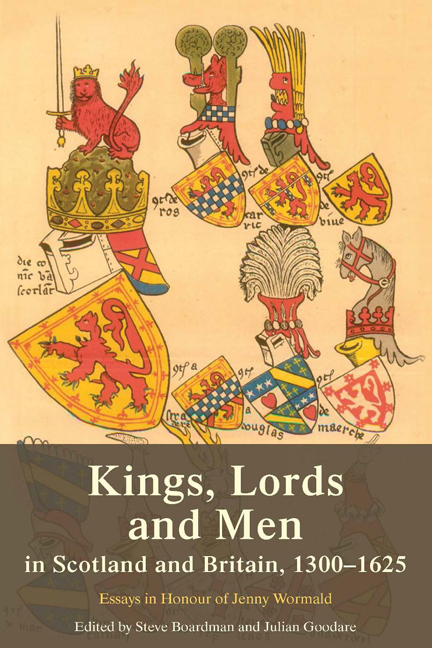Book contents
- Frontmatter
- Contents
- List of Illustrations
- Preface
- List of Abbreviations
- List of Contributors
- Introduction: Kings, Lords and Jenny Wormald
- 1 The Stewart Realm: Changing the Landscape
- Part I Lords and Men
- 2 Lords and Women, Women as Lords: The Career of Margaret Stewart, Countess of Angus and Mar, c.1354–c.1418
- 3 Bastard Feudalism in England in the Fourteenth Century
- 4 Tame Magnates? The Justiciars of Later Medieval Scotland
- 5 King, Lords and Men in Renaissance England: The Poetry of John Skelton
- 6 Rethinking the Justice of the Feud in Sixteenth-Century Scotland
- 7 Bonding, Religious Allegiance and Covenanting
- 8 ‘We Bund and Obleiss Us Never More to Querrell’: Bonds, Private Obligations and Public Justice in the Reign of James VI
- Part II Kings and Lords
- Publications of Jenny Wormald
- Index
5 - King, Lords and Men in Renaissance England: The Poetry of John Skelton
from Part I - Lords and Men
Published online by Cambridge University Press: 15 December 2017
- Frontmatter
- Contents
- List of Illustrations
- Preface
- List of Abbreviations
- List of Contributors
- Introduction: Kings, Lords and Jenny Wormald
- 1 The Stewart Realm: Changing the Landscape
- Part I Lords and Men
- 2 Lords and Women, Women as Lords: The Career of Margaret Stewart, Countess of Angus and Mar, c.1354–c.1418
- 3 Bastard Feudalism in England in the Fourteenth Century
- 4 Tame Magnates? The Justiciars of Later Medieval Scotland
- 5 King, Lords and Men in Renaissance England: The Poetry of John Skelton
- 6 Rethinking the Justice of the Feud in Sixteenth-Century Scotland
- 7 Bonding, Religious Allegiance and Covenanting
- 8 ‘We Bund and Obleiss Us Never More to Querrell’: Bonds, Private Obligations and Public Justice in the Reign of James VI
- Part II Kings and Lords
- Publications of Jenny Wormald
- Index
Summary
This chapter relates to the work of Jenny Wormald in two rather different ways. First of all, the choice of ‘Renaissance England’ in the title picks up Jenny's invocation of ‘Renaissance Scotland’ – the title for the first part of Court, Kirk and Community, and a characteristically daring one, conjuring a world of Latinate learning, eloquent persuasion, courtly exuberance and contact with Europe in a period then still seen in ‘thud-and-blunder’ terms; or, as Jenny put it, ‘fallow’, ‘dreary’, ‘the bread and butter between two layers of jam’. Jenny showed that the kingdom of Scotland in the period 1470‒1542 had a particular kind of identity and dynamic, and I hope, in the following pages, to suggest the same for the kingdom south of the Border in the period when John Skelton was writing, from the late 1480s to the mid-1520s.
The second connection is more personal and parochial: happy memories of my first experience of Oxford Further Subject teaching in the late 1990s, in classes on ‘Literature and Politics in Early Modern England’, sitting alongside Jenny in the faded grandeur of the Lady Brodie Room at St Hilda's College, Oxford. Having established her right to smoke with a silencing glare at the undergraduates, Jenny would lead the discussion with a series of shrewd and pithy observations, while I, like any tyro, would run on verbosely about the three or four things I knew. The series of classes started with a bang – More's Utopia and some of his other writings – but, before the students could embark on the delights of Sidney, Spenser and Shakespeare, there were the Tudor court poets to get through, and here things tended to slow down. While Thomas Wyatt normally elicited some animated responses, and the earl of Surrey could be despatched more quickly than Henry VIII managed, the class began with Skelton – difficult, inelegant, and very foreign to students who wanted to study a sixteenth century lit up by Italy, not blasted from Norfolk. Things would dip, and the students would look nervous, as, for once, Jenny and I would disagree. My great mistake, it seemed, was to take Skelton seriously and to see him as important, and – now with more reading behind me – I want to persist with that line of argument.
- Type
- Chapter
- Information
- Kings, Lords and Men in Scotland and Britain, 1300-1625Essays in Honour of Jenny Wormald, pp. 121 - 135Publisher: Edinburgh University PressPrint publication year: 2014



